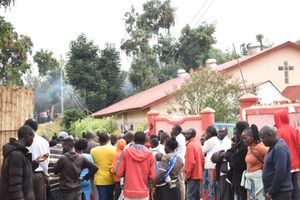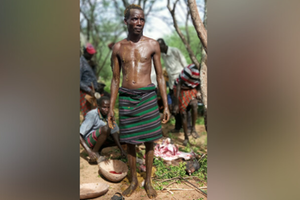
Locals in Pokot have an alternative means of punishing those found guilty of murder given their low regard for the formal justice system.
A year ago, Chepochesiapan Siareng, 70, from Alem Village in Tiaty West, Baringo was rendered a pauper, forcing her and her entire clan to live in squalor after her son was accused of killing a man from another clan following a domestic squabble.
After elders investigated and determined that her son was indeed behind the murder, a ritual known as lapai was performed and their entire clan’s livestock was taken away while their houses were torched rendering them homeless.
Lapai is basically an alternative mechanism of conflict resolution whereby if a Pokot kills a clanmate, punishment is meted by elders not only to the suspect’s family but also to the entire clan. In the ritual their animals are given to affected family as compensation.
Due to her old age and her deteriorating health, Siareng was forced to seek refuge at her daughter’s house in Mukur Village, dozens of kilometres away.
“For months now, I don’t know where my children and my grandchildren are and how they are faring on because after the ritual, all of our livestock was taken by the affected family and our houses torched after my son was suspected of killing a neighbour. I am now homeless with nothing apart from the clothes I am wearing, living one day at a time,” said the distraught Siareng while fighting back tears.
Wrath of elders
She is an example of other families that have suffered the wrath of elders after their kin killed someone from the same community.
Judah Losutan, an elder from Nginyang’ in Tiaty West said the Pokot community does not believe in formal courts because most of the locals are illiterate and are wonder why when someone is arrested and arraigned, they have to prove beyond reasonable doubt that someone committed an offence before conviction.
He said this has seen most perpetrators in the remote villages go scot-free despite the magnitude of the offence for alleged lack of evidence, forcing them to resort to alternative dispute resolution mechanisms.
“When you do statistics on diverse cases from Tiaty that reach the court, they are very minimal because they believe they are not ‘thorough’ as they put it. For instance, they report a killer to the police but they have to prove that the suspect committed the crime. The community believes in the kokwo, a gathering convened by elders because offenders are punished according to the magnitude of the crime they committed,” said Mr Losutan.
The cases, he said, are brought to the ‘kangaroo court’ after gathering enough evidence and if the perpetrator pleads not guilty, they are forced to take oaths that have severe implications.
According to Julius Akeno, an elder and an author from the community, during lapai, the houses of the entire clan where the perpetrator comes from are torched and everything confiscated to render them paupers as this acts as a deterrent measure.
Blameless members
“The punishment is only done when a Pokot kills a member of the same community, not another. It is very punitive such that the elders of the affected clan take all the livestock of the other clan whose kin killed their person(s). In this case, even the blameless members will feel the heat, their innocence notwithstanding,” said Mr Akeno.
“It is a very bad thing because the affected clan will virtually remain destitute. If anyone kills a member of the community, they are automatically inviting lapai. It is purely a Pokot affair and that is why there are no increased cases of killings within the community,” said Mr Akeno.
The court is open to everyone including children, no matter how serious the case is, including rape and adultery, so that it could serve as a deterrent measure to would-be offenders.
The Kokwo, according to the elder, also operates like any typical court and there are judges and elders who defend the offender, and may pray for leniency on the measures meted on him or her after the case.
To change the tact and tame the perennial bandit attacks in the region, the elders and local leaders now ask that whenever a person is suspected of killing during raids, they not only initiate lapai but also surrender an individual to relevant authorities for action.
Stealing livestock
Kamama Siwareng, an elder from Silale in Tiaty East, an area suspected to a hideout for bandits said the move would deter gangs from stealing livestock and killing people in the name of archaic cattle rustling.
“The lapai punishment has worked in taming killings in the Pokot community. We want now to initiate the same on anyone who kills and later we present the same person to the police to be charged. Criminals have been on a killing spree and we cannot allow that to happen again under our watch,” said Mr Siwareng.
Ripkwo/ Kositei MCA Daniel Tuwit said the alternative conflict resolution is lenient and instead killers should be presented to the police and given the maximum sentencing in court.
“There is no reason of carrying out lapai on a killer and later left free. Others are notorious and they will go back committing the same crimes. They need to be arrested and charged in court,” said Mr Tuwit.
Joseck Abwajo, a State counsel based at the Kabarnet Court acknowledged that many incidents from the remote areas are not reported to the police to allow prosecution, a move that has led to cases that are not supposed to be settled out of court handled by elders. “Alternative dispute resolution is available to offenses as along as it does not fall under the sexual offenses Act, which is not allowed to be settled out of court and also if the matter is of public interest,” said Mr Abwajo.
Otherwise, he said, the Constitution allows the alternative system of justice to be used especially where the parties have close relationships such as relatives or neighbours, and there is need to foster cohesion.
He also stated that murder cases are not supposed to be resolved out of court, but through plea bargains where the parties want the accused to plead to a lesser charge, such as manslaughter, especially when the accused did not intend to kill the victim, instead of going through a full trial.
Far-flung villages
He raised concern that prosecution of cases in the far-flung villages has been hampered whereby when a suspect is arrested and taken to court, witnesses don’t show up, scuttling the process.
“A suspect may be arrested in those war-torn areas and brought to court by the police but they come up with little or no investigation to implicate the person, owing to a myriad of challenges. For the court to be able to process a file and charge someone of a crime there must be enough evidence because we are guided by the law. As such, you must be able to convince the court otherwise,” he stated.
The prosecutor told the Nation that they are guided by the decision to charge which is dependent on the threshold of evidence.
“The matter may be of public interest but you will not introduce to court because it has to be accompanied by tangible evidence that could prove beyond reasonable doubt that someone committed the crime,” said the State counsel.
According to Abwajo the terrain where the suspects come from has also hampered prosecution because they are inaccessible. “Even if you get the witnesses, procuring them to court is another challenge especially if you have a hearing of a case because there is no clear means of transport, poor mobile network and you may need to rely on chiefs who are also miles away from the people you want in court,” he stated.










